Welcome back, readers! You may have read 14 East’s Voting Guide (if not, check it out here). The Voting Guide walks through the how-to’s of voting in Chicago this November. In writing the Voting Guide, we realized that there are two elements to voting: the mechanics, and the issues.
So, here, we at 14 East will identify and elaborate on some of the ballot items you’ll be voting on this November, from Cook County races to tax policy and other important referenda. This guide is not written as an endorsement of any particular candidate or ballot item, and we can’t tell you who to vote for. Our intention is to empower you, dear reader, with a convenient and organized resource with the information you need to know before making your 2020 decisions.
Click here to read this guide in Spanish. (Haz click aquí para leer en español.)
Fair Tax: What is it? Why is it important?
If you’re living in Illinois, you’ve likely seen or heard one of the many “Say Yes to Fairness” advertisements on your streaming platforms, social media or T.V. That’s because the Illinois Allow for Graduated Income Tax Amendment, commonly known as the “Fair Tax,” has arguably been Governor J.B Pritzker’s number one policy initiative since running for election in 2018.
The Fair Tax would alter Illinois’ constitutional amendment that sets income tax at a “flat rate” – meaning everyone pays the same rate – to a “graduated rate,” in which folks with a higher income will pay a higher rate than those with a lower income. The current “flat tax” income tax rate is 4.95 percent, and if approved, there would be new rates for higher income brackets, ranging up to a 7.99 percent rate.
If adopted into Illinois’ constitution, Illinois would become the 33rd state to adopt a graduated income tax. States that have adopted this form of income tax all have varying rates, with the highest tax rate being over 13 percent for millionaires in California. Pritzker and other Fair Tax supporters contend that the Fair Tax will help small businesses and this is the fairest way to increase tax revenue in Illinois, which is looking at a deficit in the COVID-19 pandemic.
Additionally, the bill would not allow retirement income to be taxed. Per the new amendment, income tax could be increased later, but it would have to be within the parameters of the new “progressive” structure, meaning that higher incomes are taxed more than lower.
The Illinois government has also released a “Fair Tax calculator,” which allows you to enter recent income data to predict how much your taxes would increase or decrease under the new amendment.
The measure will look like this on your ballot, with the option to vote ‘Yes’ or ‘No’:
Proposed Amendment to the 1970 Illinois Constitution
The proposed amendment grants the State authority to impose higher income tax rates on higher income levels, which is how the federal government and a majority of other states do it. The amendment would remove the portion of the Revenue Article of the Illinois Constitution that is sometimes referred to as the “flat tax,” that requires all taxes on income to be at the same rate. The amendment does not itself change tax rates. It gives the State the ability to impose higher tax rates on those with higher income levels and lower income tax rates on those with middle or lower income levels. You are asked to decide whether the proposed amendment should become a part of the Illinois Constitution
Voters should also know that both the support and the opposition to this bill have been fueled by some pretty big funders. The “Vote Yes for Fairness” political action committee (PAC) is chaired by Quentin Fulks, one of Pritzker’s former campaign staffers, and was formed out of the 501(c)4 nonprofit Think Big Illinois, which Fulks also leads.
The Vote Yes for Fairness PAC and allied PACs have raised over $60 million as of mid-October, $56.5 million of which has been contributed directly by Pritzker himself.
For the opposition, there are two major PACs pushing for voters to say “no” to the new amendment: the “Coalition to Stop the Proposed Tax Hike” and “Say No to More Taxes.” The opposition has been funded primarily by Illinois’ richest person, billionaire and CEO of Citadel Ken Griffin, who has donated $53.75 million to the “Coalition to Stop Proposed Tax Hike Amendment” PAC to date.
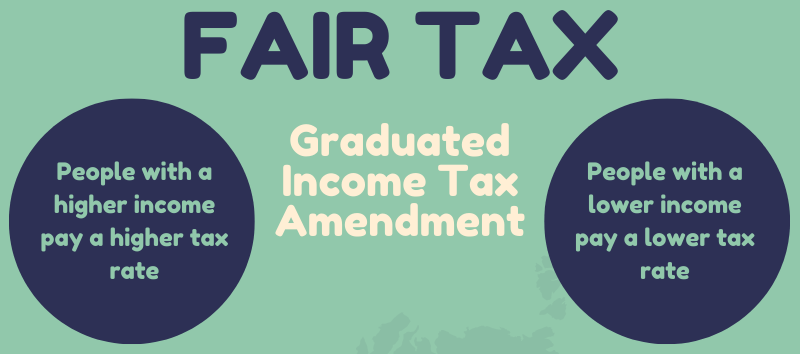
Public Questions
Public Question #1
The first Public Question Chicago voters will encounter on their ballots asks, “Should the City of Chicago act to ensure that all the City’s community areas have access to broadband Internet?”
A vote “yes” supports the referendum and advises the city to ensure greater access to high-speed Internet services.
A vote “no” to the referendum opposes advisement to provide all community areas with broadband Internet access.
A simple majority is needed for the question’s approval, which acts as an advisory vote to gauge citizens’ perspectives on broadband Internet access. The question is non-binding, meaning no actual policy or law will be adopted by the city.
So far, Mayor Lori Lightfoot is expected to fund around $50 million into the Chicago Connected program, which provides eligible Chicago Public School (CPS) students with free high-speed Internet or a district-provided hotspot for at least one year, but could guarantee up to four years of access.
However, a Kids First Chicago study published in April found one in five children under the age of 18 lacked access to broadband Internet services citywide, primarily from Black and Latinx communities on the South and West Sides.
While approval of Public Question 1 would not create any legal changes, it could be a stepping-stone to introduce bills later on.
According to their website, CPS — like most Chicagoland area schools — is expected to remain online during the second quarter of the 2020-2021 school year.
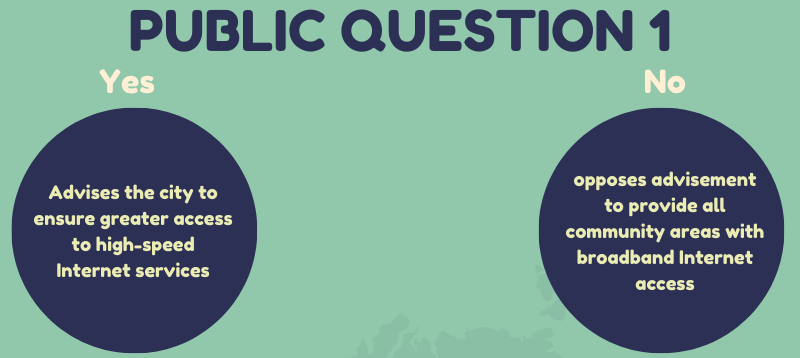
Public Question #2
The second Public Question on the ballot asks, “In creating its City-wide plan for continued growth and sustainability, should the City of Chicago place equal focus on the goals of resilience, equity, and diversity?” A vote “yes” supports the local ballot measure to advise the city to place equal focus on the goals of resilience, equity, and diversity while creating the plan for continued growth and sustainability. A vote “no” for the local ballot measure opposes advising the city to place equal focus on the goal of resilience while creating the plan for continued growth and sustainability. For the approval of the city plan goals advisory measure, a simple majority is required. This is an advisory question, which is “a type of ballot measure in which citizens vote on a non-binding question.” The difference between this question and any other type of ballot measure is that the outcome does not change anything on any legal level. Rather, the question is posed symbolically as a means to hear the opinion of the public.
This question is posed for voters to help “the city’s Department of Planning and Development shape an upcoming push for a comprehensive, citywide development plan.” Two Aldermen — Ald. Andre Vasquez (40th Ward) and Ald. Raymond Lopez (15th Ward) have publicly expressed concerns about the vagueness of the question, both citing that it will lead to an overwhelming majority of “yes” votes. This question comes during a time of high racial tensions in Chicago, specifically in regards to the rising police brutality concerns.

Public Question #3
The third public question on Chicagoans’ ballots, centered on assault weapon restrictions, asks, “Should the State of Illinois restrict the sale or possession of firearms that have been defined as assault weapons or of magazines that can hold more than a certain number of rounds of ammunition?” A vote “yes” supports a state restriction on the sale or possession of any assault weapons, as well as a restriction on firearm magazines that can carry a certain amount of ammunition rounds. A vote “no” opposes these state restrictions on assault weapon purchase and magazine size. A simple majority is required for the question’s approval. This question is advisory to the State of Illinois, meaning that it will not put a new law or regulation in effect. The advisory question is placed on ballots to assess the public’s opinion regarding the issue.
On the subject of the assault weapon advisory question, Ald. Chris Taliaferro of the 29th Ward said, “We have to take a radically different approach” after multiple children were shot during a spike in gun violence this summer. The question is opposed by 15th Ward Ald. Raymond Lopez, who said the question is a “waste of space” considering a 2016 resolution to ban assault weapons was approved by City Council.
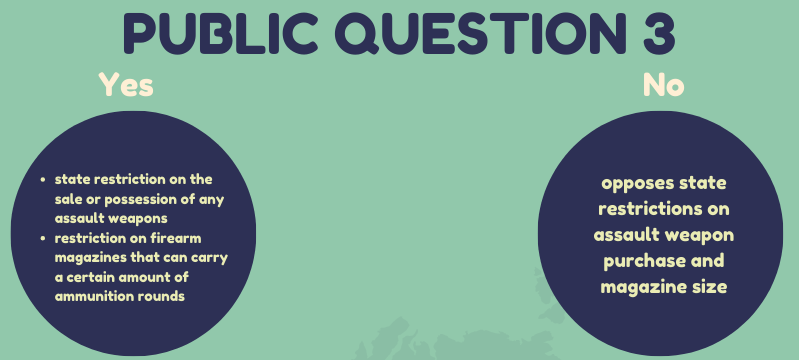
Metropolitan Water Reclamation District
Chicago set record rainfall levels this past spring, which came with its fair share of flooding. Climate change’s growing urgency and rising water levels in Lake Michigan make the Metropolitan Water Reclamation District (MWRD) Board race critical.
The board is in charge of water-based infrastructure for metropolitan Chicago and 128 suburban communities. The role is an elected bureaucratic position, and commissioners are in charge of things like flood control strategy, invasive Asian carp in the Great Lakes and untreated wastewater in Lake Michigan.
The MWRD Board receives little coverage and there isn’t much voter knowledge, considering how low it is on the ballot and the fact that it’s an elected bureaucratic position. MWRD commissioners are also some of the highest-paid city workers, averaging at about $98,000 a year. In classic Chicago fashion, the MWRD has seen their fair share of accusations of corruption, patronage and a general lack of transparency. Two MWRD cops were fired in 2017 after a video was released of them bragging about sleeping on the job. MWRD has also leased land to a company with a history of chemical spills.
“The Metropolitan Water Reclamation District is bearing the brunt of climate change in our region … and Black and Brown communities are disproportionately impacted by flooding in the region,” candidate Eira Corral Sepulveda told 14 East in March, referencing a study by the Center for Neighborhood Technology.
There are six candidates running for three six-year terms on the MWRD Board. For the Democrats, there is M. Cameron Davis, incumbent and former President Barack Obama’s point person on the Great Lakes. Kimberly Neely Dubuclet is also an incumbent, and former state representative. DePaul alumna Eira L. Corral Sepulveda is the third-term Hanover Park village clerk.
Davis, Dubuclet and Corral Sepulveda are endorsed by Democratic politicians, local unions, the Chicago Tribune, Chicago Sun-Times and Girl, I Guess Progressive Voter Guide.
But there are also three Green Party candidates: Chicago Public Schools teacher Tammie Felicia Vinson; Rachel Wales, a farming advisor and freelance writer; and Troy Antonio Hernandez, a data scientist who received a “respectful nod” for a “number of thoughtful ideas” by the Chicago Sun-Times.
The Green Party has a comprehensive platform aimed at curbing corruption on the board and combating climate change, but as often seen with the Green Party, information on the candidates is sparse. There are no Republicans on the ballot.
Cook County State’s Attorney race
The race for Cook County’s State’s Attorney is one that could impact policy and precedent for years to come; states’ attorneys serve as prosecutors for their respective court districts, providing legal counsel to and support on behalf of the jurisdiction, including for elected officials and agencies.
In Cook County, the race has three contenders seeking to serve the county’s courts – Kim Foxx, the Democratic incumbent; Pat O’Brien, a Republican challenger; and Brian Dennehy, the Libertarian candidate.
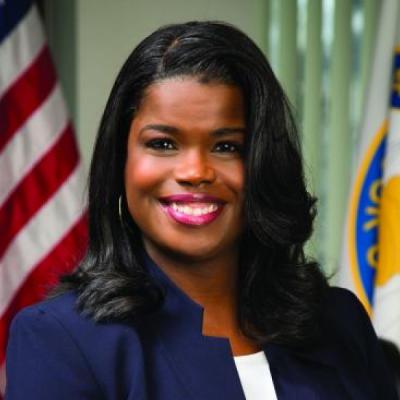
Image from Kim Foxx’s campaign website
Foxx, the Democratic incumbent, was elected to the office in 2016 and is finishing up her first term. In the past four years, her term has been marked with aspirations to oust corruption in the Cook County courts system as well as scandal and accusations of mismanagement surrounding last year’s Jussie Smollett case, which saw fervent conversations and debate around recusals and conflict of interest. Outside of the Smollett case, Foxx changed how Cook County prosecutes low-level, mostly nonviolent offenses like drug possession and shoplifting, according to the Marshall Project, which estimates that there was an approximately 6 percent decrease in caseload for felony cases in the district.
The Chicago Sun-Times editorial board endorsed Kim Foxx in September, citing how her approach to processing felony charges and petty offenses worked to divert cases to alternative sentencing programs, like drug treatment and mental health centers, from an already overburdened prison system.
“We understand violence remains a huge problem in Chicago, which is on pace to see its highest annual homicide count in more than two decades,” the endorsement reads. “But the ultimate solution must involve the county’s top prosecutor working alongside Chicago police, federal authorities, the mayor, community stakeholders, academics and others.”
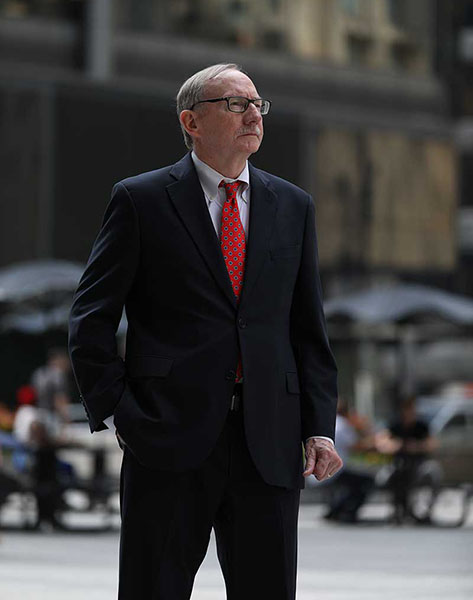
Image from Pat O’Briens campaign website
O’Brien, the Republican challenger to Foxx’s re-election bid, is a hardline law-and-order candidate, having served as a prosecutor for nearly two decades with the State’s Attorney’s office, as well as a defense attorney and as a Circuit Court judge. Critical of Foxx’s handling of the Jussie Smollett case, O’Brien’s focus is on eliminating gang violence and prosecution of criminal cases resulting from the summer’s protests.
Capitol Fax reported earlier in October that O’Brien is being tied to over $64 million in wrongful conviction settlements from 1989 to 1993, including instances where O’Brien was the lead prosecutor on the case. The Chicago Tribune’s editorial board, which typically leans for Republican candidates, endorsed O’Brien, despite endorsing Foxx in 2016, stating that “the work Foxx has done to reverse wrongs in the Cook County system is laudable,” but that “some mistakes are too serious to warrant a second term.” O’Brien has also been backed financially and politically by Chicago’s lodge of the Fraternal Order of Police, who donated the maximum allowed under campaign finance law.
Dennehy, the Libertarian Party contender, has yet to create a formal campaign website, though is active on his campaign’s Facebook page, and has not yet filed a campaign committee report with the Illinois State Board of Elections, according to the Chicago Tribune, which is an indicator of a lack of political fundraising above $5,000. Currently an attorney, Dennehy wrote in a statement to WTTW that he is an “upset citizen tired of listening to political platitudes,” and, if elected to the office, he “would listen to and work with community organizations to find solutions that are actually effective in reducing violence rather than turning to prosecutors, police and cages for every problem.”
All infographics by Yusra Shah
Header image by Bridget Killian
This guide was developed by the 14 East Staff, written by Francesca Mathewes, Patsy Newitt, Cam Rodriguez, Julian Martinez, Elly Boes, and Eiman Navaid. Edited by Robin Mosley.


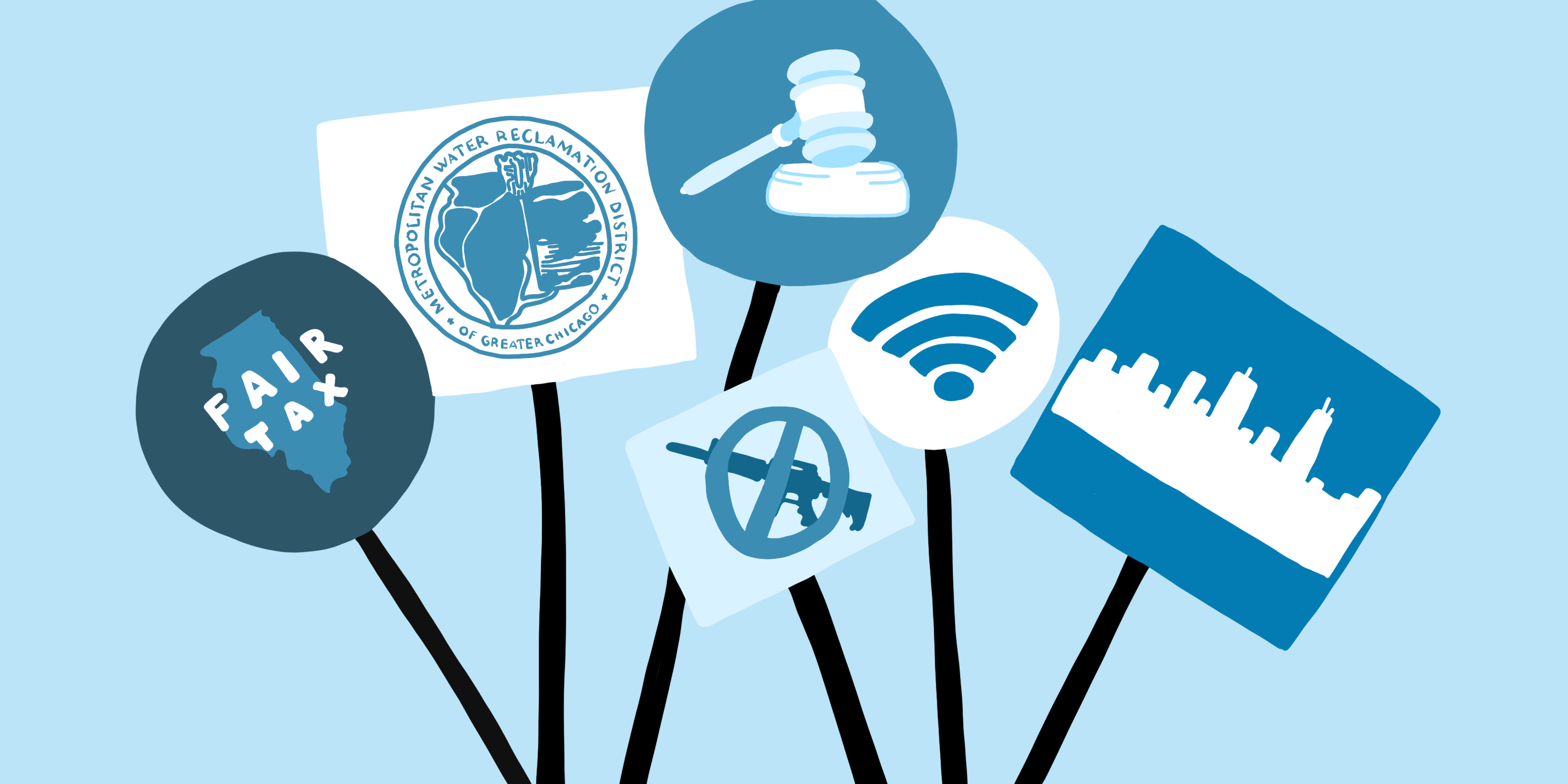

NO COMMENT